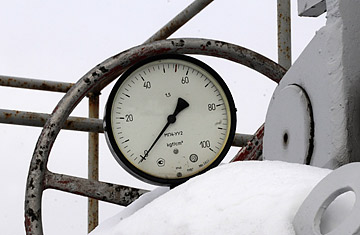
A gas-pressure gauge indicates zero at a snow-covered transit point on the main pipeline from Russia in the village of Boyarka, near Kiev, Ukraine, on Jan. 3
For decades, Russia's New Year has been marked by two traditions: eating Salade Olivier, a delicious salad named for French chef Lucien Olivier, who cooked at Moscow's Hermitage restaurant in the 1860s, and the 12 midnight chimes of the Kremlin Spasky Tower clock. Over the past three years, a new tradition seems to have taken hold: a New Year's spat with Ukraine over Russia's supply of natural gas.
This New Year proved no exception. In the buildup to Dec. 31, Russia accused Ukraine of having arrears of more than $2 billion on its expired gas contract. Ukraine said it had paid all its debt. Moscow said it would start charging a new price, which it presented as both the "market" price and a "preferential" rate — just $250, a rather sharp increase over the 2008 price of $179.50 per 1,000 cu m of gas. Ukraine said it could pay $201. (See pictures of rich Russians.)
In response, Gazprom, Russia's state-run natural gas monopoly, dropped its preferential offer and said it would have to charge the real market rate of $418. It also insists that Ukraine still owes Moscow $614 million and at 10 a.m. on Jan. 1, turned off gas taps to Ukraine.
Both Russia and Ukraine vow that their spat won't affect gas supplies to the European Union. But within a day, Balkan countries were complaining that the gas flow had dropped, in some cases by 25%. Gazprom says Ukraine is "cynically stealing" Russian gas. Naftogaz, the Ukrainian counterpart of Gazprom, said it had used 21,000 cu m of Russian gas to keep up the pressure in pipes and ensure gas could keep flowing further west. Ukraine had never committed to use its own gas to do that, it said.
The 2009 spat is different in crucial ways from previous years'. Politics is still central to the disagreement. Moscow remains unhappy with Ukraine's pro-NATO President, Victor Yushchenko. That has been bolstered by accusations that Ukraine helped Georgia in last summer's war with Russia over the breakaway province of South Ossetia. Both Russian President Dmitri Medvedev and Premier Vladimir Putin, Russia's real boss, vowed to punish Ukraine for having supplied weapons and personnel that made it possible for Georgians to shoot down Russian planes, including a strategic TU-22 bomber.
But Putin's first concern is cash, especially because Russia's economic indicators are heading south fast. Russia's foreign reserves dropped from $597 billion last August to $438 billion last month. Putin wants to collect as much as he can from the Ukrainian enemy because he just promised his allies in Belarus to cut gas prices three times this year in exchange for political concessions.
Russia doesn't have sufficient gas supplies of its own to sell. Moscow buys gas from Central Asian countries — at $386 per 1,000 cu m — mixes it with its own cheap gas and then sells it to Ukraine. Ironically, these supplies are delivered through a company called Rosukrenergo, 50% of which is owned by Gazprom. In effect, Gazprom is angry at its own subsidiary.
Now Ukraine will either have to accommodate Russia's new demands or see its industries and currency collapse. Europe, which gets a fifth of its gas through Ukraine, might also have to brace for trouble. Ukraine has warned that European countries could see major shortfalls within 10 to 15 days because without a minimum amount of gas in the pipelines, an automatic shutdown will be triggered. Gazprom says such statements are blackmail. In the past few days, President Medvedev approved Gazprom's move to take Ukraine to an arbitration court in Stockholm. Ukraine's Naftogaz says it will countersue. While both sides blow hot air, millions may soon feel winter's chill.
